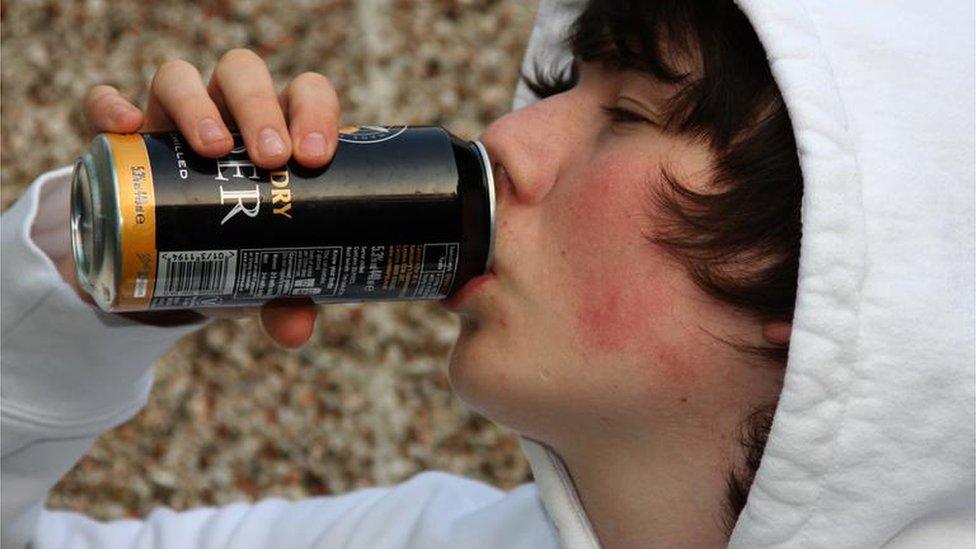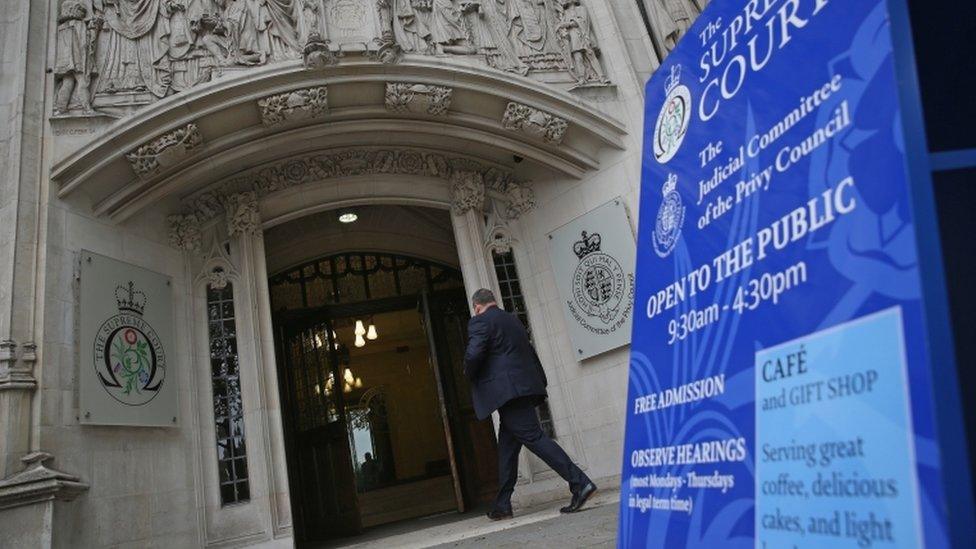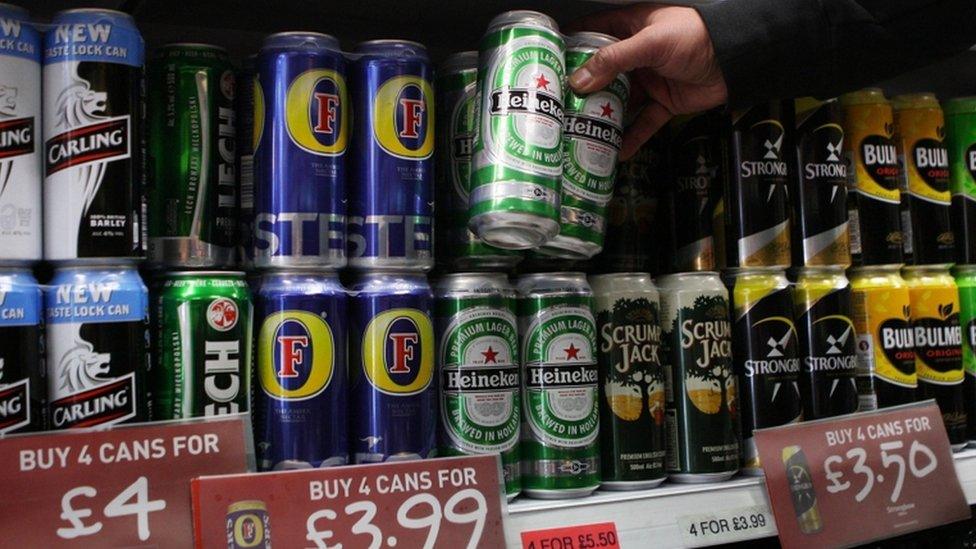Why does Scotland still not have minimum pricing?
- Published

The Scottish government believes cracking down on cheap alcohol will help tackle the country's binge-drinking culture
Legislation that would introduce a minimum price for a unit of alcohol was given Royal Assent by the Queen after being passed by the Scottish Parliament four years ago - but the policy still hasn't been introduced.
With lawyers once again due to argue over the proposals at the Court of Session this week, here's a look at the background to the minimum pricing plans - and where they might be going next.

What is the Scottish government trying to do?
The SNP, which has formed the Scottish government for the past nine years, has been trying to introduce minimum pricing for alcohol since 2009.
It wants to set the price of a unit of alcohol at 50p - meaning the cost of the strongest ciders would more than double in off-licences, while a four-pack of 4% lager would cost at least £4, a bottle of whisky would cost at least £14 and a bottle of wine a minimum of about £4.50.
Supporters of minimum pricing, external believe the move is necessary to tackle the country's binge drinking culture, with Scots buying 20% more alcohol on average than people in England or Wales.
They say that alcohol is now 60% more affordable in the UK than it was in 1980, and that it is now possible to exceed the maximum weekly recommended intake of alcohol for men for less than £5.
The minimum pricing policy - which received wide support from health professionals, the police, alcohol charities and sections of the drinks industry - was voted down by opposition MSPs when it first came before the Scottish Parliament in 2010.
But the SNP tried again after being re-elected with a majority the following year, and the Alcohol (Minimum Pricing) (Scotland) Act was passed by Holyrood in May 2012.

So why does Scotland still not have minimum pricing?

European wine-producing countries are strongly opposed to minimum pricing
The proposals immediately came under attack from five wine-producing nations - France, Italy, Spain, Bulgaria and Portugal - who are concerned that it would increase the cost of their products in Scotland.
But more importantly, they are concerned about Scotland setting a precedent that the rest of the UK and other countries around the world could follow.
In its legal guidance to the Scottish government, the European Commission said it believed minimum pricing was a disproportionate way of tackling Scotland's problem drinking.
And it raised concerns that the policy could breach EU competition law by restricting imports of foreign alcohol.
Separately, the Scotch Whisky Association (SWA) launched a legal challenge to the policy in the Scottish Courts.
The SWA also says minimum pricing would breach EU trade laws, be ineffective in tackling alcohol misuse, penalise responsible and poorer drinkers, and damage an export industry worth more than £4bn to the Scottish economy every year.
The Court of Session dismissed their case, but the SWA has not given up on its legal battle, with the appeal process reaching the European Court of Justice (ECJ) last year.
The ECJ agreed that minimum pricing may breach EU rules on free trade, and suggested that the Scottish government should instead look at using tax increases as a way of raising the price of alcohol.
However, the ECJ also said that it should be for the Scottish Courts to decide - and so the case is back before a panel of three judges in the Court of Session in Edinburgh.
The Scottish government has indicated it will not introduce minimum pricing until the legal process is complete.

What's likely to happen next?

The legal battle over minimum pricing looks destined to end up in the Supreme Court in London
The Court of Session is due to hear two days of legal arguments for lawyers acting for the Scottish government and the SWA.
After examining all of the evidence - including the opinion of the European Court of Justice - the three judges will decide whether improvements in public health could be achieved by other means, such as increasing tax rates on alcohol, rather than minimum pricing.
They will deliver their findings at a later date - but even that is unlikely to be the end of the saga, with an appeal against the ruling likely from either the Scottish government or the SWA.
That would see the case end up in the UK's highest court of appeal - the Supreme Court in London.

What's the situation elsewhere in the UK?
The UK government has supported the devolved Scottish administration during the legal process, arguing that minimum pricing is compatible with EU law.
Prime Minister David Cameron pledged in 2012 to introduce minimum pricing - but the plan was shelved a year later in the face of fierce opposition from the drinks industry.
The Home Office has said the policy remains under review, with calls for its reintroduction in England likely to be reignited if it is eventually implemented in Scotland.
And last year, the Welsh government published its own proposals for a 50p minimum price for a unit of alcohol
It followed research suggesting the move would save nearly £900m over 20 years by cutting crime and illness, with 50 fewer deaths a year across Wales.
In Northern Ireland, former Health Minister Jim Wells had been seeking to introduce minimum pricing before resigning in April of last year.
- Published7 June 2016
